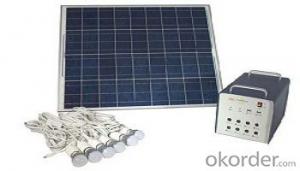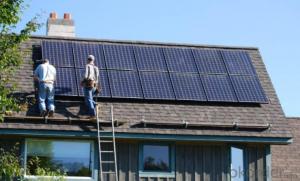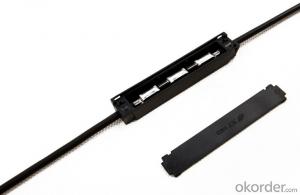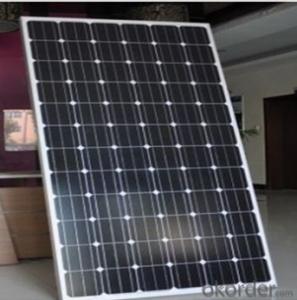CNBM Solar Home System CNBM-K7 (3KW)
- Loading Port:
- China Main Port
- Payment Terms:
- TT or L/C
- Min Order Qty:
- 1 set set
- Supply Capability:
- 1000 sets per month set/month
OKorder Service Pledge
OKorder Financial Service
You Might Also Like
Brief Introduction of Solar Energy System CNBM-K7 (3KW)
CNBM Home System-K7 (3KW) has a wonderful capacity.It can be used in factory,home,school and other CNBM Home System-K7 (3KW) consist of the solar modules,charge controller,inverter and battery banks.
CNBM International is highly recognized by its business partners and clients all over the world and has obtained rapid development under the spirit of win-win .
With CNBM Home System-K7 (3KW),
We will carry on the mutual beneficial,innovative and revolutionary trading structure as we did before,create value for our employees,share holders and clients and benefit the whole society in our future development.Please contact us ,if you have interest in CNBM Home System-K7 (3KW),don’t hesitate!
The Sketching of Solar Energy System CNBM-K7 (3KW)
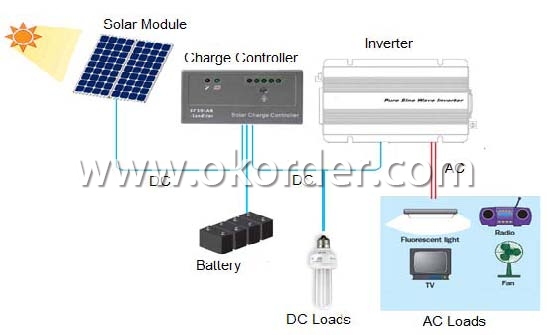
Components of Solar Energy System CNBM-K7 (3KW)
PV Array:
Convert sunlight instantly into DC electric power. Formed by the solar modules (also called photovoltaic modules) in accordance with the system requirements for series and parallel.
Solar Charge Controller:
A charge controller may be used to power DC equipment with solar panels. The charge controller provides a regulated DC output and stores excess energy in a battery as well as monitoring the battery voltage to prevent over charge or over discharge. An inverter can be connected to the output of a charge controller to drive AC loads.
Inverter:
Converts DC output power of photovaltaic soalr panels into standard AC power for use in the local off-grid electrical network. It is a critical component in a photovoltaic system, allowing the use of ordinary commercial appliances.
Battery banks:
Stores energy when there is an excess coming in and distribute it back out when there is a demand. Solar PV panels continue to re-charge batteries each day to maintain battery charge.
Technical data of Solar Home System CNBM-K7 (3KW) | ||
Inverter | Rated load power | 3000W |
Output wave | Pure sine wave | |
Output voltage | DC 48V | |
Output frequency |
AC:220V | |
Precision of output | 50HZ/60HZ | |
Precision of output frequency | ±6% | |
Solar panel | Pmax | 245W*12PCS |
Vmp | 31.1V*2 | |
Imp | 7.89A*6 | |
Charger | Charger voltage & current | 48V /30A*3PCS |
Battery | Capacity | 12V 135AH*4*3PCS |
Support | Aluminum | 2PCS/SET*6 |
Power box | Spray paint iron box,with input,output,ammeter,voltmeter,master swith and so on. | |
Package of Solar Home System CNBM-K7 (3KW) | ||||
Part | Size(L*W*H mm) | Weight(kg) | 20’(pcs) | 40’(pcs) |
Power box | 800*540*780 | 70 | 20 Sets | 26 Sets |
Solar panel | 1655*992*40 | 280 | ||
Battery | 1100*520*650 | 600 | ||
Factory Picture of Solar Energy System CNBM-K7 (3KW)
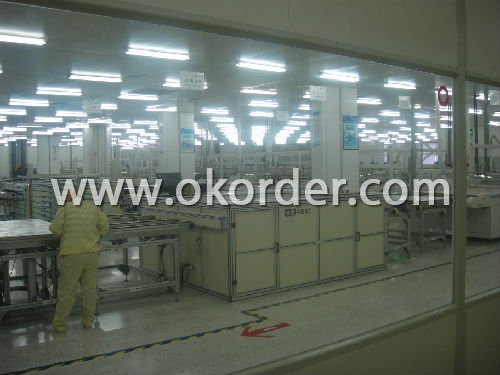
Package Picture of Solar Energy System CNBM-K7 (3KW)
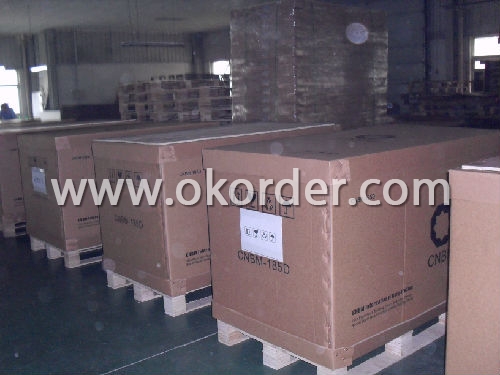
- Q:Can solar energy systems be installed in areas with extreme temperatures?
- Yes, solar energy systems can be installed in areas with extreme temperatures. Solar panels are designed to withstand a wide range of temperatures, including both hot and cold climates. However, extreme temperatures can affect the efficiency and performance of the system, so proper design and insulation measures should be taken into consideration during installation to ensure optimal performance and longevity.
- Q:Can solar energy systems be used in powering outdoor signage or billboards?
- Yes, solar energy systems can be used to power outdoor signage or billboards. Solar panels can be installed on the roof or nearby structures to harness sunlight and convert it into electricity. This electricity can then be used to power the lights or digital displays of the signage or billboards, making them completely independent of the traditional power grid. Solar energy systems are particularly suitable for outdoor signage as they are often located in areas with abundant sunlight. Additionally, using solar energy helps reduce the carbon footprint associated with traditional electricity generation, making it an environmentally friendly choice.
- Q:Are there any risks of electrical short circuits with solar energy systems?
- Solar energy systems, like any other electrical system, have the potential for electrical short circuits. When there is an unintended path of low resistance, a short circuit occurs and allows a large amount of current to flow. This can be caused by faulty wiring, damaged components, or improper installation. Short circuits can lead to overheating, electrical fires, or system damage. The excessive current flow can melt wires, burn insulation, and even harm the solar panels themselves. In extreme cases, short circuits can cause explosions or other dangerous situations. To reduce the risks of short circuits, it is crucial to have qualified professionals install the system according to safety guidelines and local codes. Regular maintenance and inspections are also important for identifying and addressing potential issues. Installing a circuit breaker or fuse within the system can automatically disconnect the circuit in case of a short circuit. Using high-quality components and wiring specifically designed for solar energy systems can also help minimize the risks of short circuits. It is important to follow the manufacturer's instructions and guidelines for system maintenance and operation. In conclusion, although there are risks of electrical short circuits with solar energy systems, these risks can be effectively managed and minimized through proper installation, regular maintenance, and adherence to safety guidelines.
- Q:Can a solar energy system be used off-grid?
- Yes, a solar energy system can be used off-grid. Off-grid solar energy systems are designed to generate and store electricity independently, without relying on the traditional power grid. These systems typically include solar panels to capture sunlight, a battery bank to store excess energy, and an inverter to convert the stored DC power into AC power for use in homes or buildings. Off-grid solar systems are commonly used in remote areas or for recreational purposes where connecting to the grid is not feasible or desired.
- Q:What is the impact of snow on the performance of solar panels?
- The impact of snow on the performance of solar panels is generally negative. Snow accumulation on the surface of solar panels can block sunlight, reducing their efficiency and power output. Additionally, snow can create a layer of insulation, preventing the panels from generating electricity. However, the angle and tilt of the panels, as well as the temperature, can also influence the impact of snow.
- Q:Can a solar energy system be installed on a thatched roof?
- Yes, a solar energy system can be installed on a thatched roof. However, there are certain considerations that need to be taken into account. Thatched roofs are made of dry vegetation materials, which are highly flammable, so it is important to ensure that the solar panels and their installation do not pose any fire hazards. Additionally, the weight of the solar panels needs to be carefully assessed to ensure that the thatched roof can support the added load. The installation process may require specialized mounting systems and extra precautions to protect the integrity of the thatched roof. Overall, while it is possible to install a solar energy system on a thatched roof, it is important to consult with professionals who have experience in working with thatched roofs to ensure proper safety measures are in place.
- Q:What is the role of batteries in off-grid solar energy systems?
- The significance of batteries in off-grid solar energy systems cannot be overstated, as they function as the primary storage devices for the solar energy generated. In situations where access to a utility grid is not available, batteries are utilized to store surplus solar energy produced during the day, which can then be utilized at night or during periods of limited sunlight. Energy is stored within the batteries in the form of chemical potential energy, and can be converted back into electrical energy as required. This ensures that a consistent and dependable power supply is maintained, even when solar panels are not actively generating energy. Moreover, batteries contribute to the stability and equilibrium of off-grid solar systems. They act as a buffer, absorbing any fluctuations in energy production and demand. For example, when energy demand is high, batteries can discharge their stored energy to meet the load requirements, thus avoiding any disruptions or power shortages. Furthermore, batteries are instrumental in preserving the longevity and efficiency of solar panels. By storing excess energy, batteries prevent the panels from being strained by excessive production, which could result in premature wear and tear or even damage. To summarize, batteries are an indispensable element of off-grid solar energy systems, as they facilitate energy storage, provide stability, and ensure an uninterrupted power supply. Their presence is crucial for the reliable and sustainable generation of off-grid electricity.
- Q:How much space is required to install a solar energy system?
- The space required to install a solar energy system varies depending on the system's capacity and the available sunlight. On average, a typical residential solar panel system requires around 100 to 400 square feet of roof space. However, ground-mounted systems can also be used when roof space is limited, requiring about 1000 to 2000 square feet of land. It is important to consult with a solar energy professional to determine the exact space requirements based on specific energy needs and site conditions.
- Q:How does the quality of solar panels vary based on the manufacturer?
- The quality of solar panels can vary significantly based on the manufacturer. Different manufacturers use different technologies, materials, and manufacturing processes, which directly impact the performance, reliability, and lifespan of the panels. Firstly, the efficiency of solar panels can vary based on the manufacturer. Efficiency refers to the ability of the panels to convert sunlight into electricity. Some manufacturers may use more advanced and efficient solar cell technologies, such as monocrystalline or thin-film, which can result in higher conversion rates compared to panels using polycrystalline cells. Secondly, the durability and reliability of solar panels are affected by the manufacturer. High-quality manufacturers conduct rigorous testing and use superior materials to ensure their panels can withstand harsh weather conditions, temperature variations, and impact from debris. They may also offer longer warranties, indicating their confidence in the product's durability. Thirdly, the lifespan of solar panels can vary based on the manufacturer's quality. Panels from reputable manufacturers are designed to have a longer operational life, typically ranging from 25 to 30 years. They may incorporate features such as anti-degradation technologies that prevent power output degradation over time. Furthermore, the manufacturing processes employed by different manufacturers can impact the overall quality of the panels. Manufacturers with strict quality control measures and standardized production practices tend to produce more reliable and consistent panels. They may also have certifications and comply with industry standards, ensuring their products meet or exceed set requirements. Lastly, customer service and support can also vary based on the manufacturer. Reputable manufacturers often provide excellent customer support, including after-sales services, technical assistance, and warranty coverage. This level of support can greatly impact the overall experience and satisfaction of solar panel owners. In conclusion, the quality of solar panels can differ significantly based on the manufacturer. It is important for consumers to research and choose panels from reputable manufacturers that offer higher efficiency, durability, lifespan, and customer support. Investing in high-quality solar panels ensures optimal performance and long-term savings in electricity costs.
- Q:Can solar energy systems be used for powering remote communication towers?
- Yes, solar energy systems can be effectively used for powering remote communication towers. They provide a reliable and sustainable source of power in areas where grid connectivity is limited or non-existent. Solar panels can be easily installed on the tower structures and their energy can be stored in batteries for continuous power supply, even during cloudy or nighttime conditions. This not only reduces the dependence on diesel generators but also helps in reducing carbon emissions and operational costs.
1. Manufacturer Overview |
|
|---|---|
| Location | Ningbo,China |
| Year Established | 2004 |
| Annual Output Value | Above US$0.3 Billion |
| Main Markets | Australia;Europe. |
| Company Certifications | ISO9001:2008;VDE;CE |
2. Manufacturer Certificates |
|
|---|---|
| a) Certification Name | |
| Range | |
| Reference | |
| Validity Period | |
3. Manufacturer Capability |
|
|---|---|
| a)Trade Capacity | |
| Nearest Port | Ningbo |
| Export Percentage | 0.4 |
| No.of Employees in Trade Department | 10 People |
| Language Spoken: | English;Chinese; |
| b)Factory Information | |
| Factory Size: | Above 4,000 square meters |
| No. of Production Lines | Above 5 |
| Contract Manufacturing | OEM Service Offered;Design Service Offered |
| Product Price Range | Average |
Send your message to us
CNBM Solar Home System CNBM-K7 (3KW)
- Loading Port:
- China Main Port
- Payment Terms:
- TT or L/C
- Min Order Qty:
- 1 set set
- Supply Capability:
- 1000 sets per month set/month
OKorder Service Pledge
OKorder Financial Service
Similar products
New products
Hot products
Hot Searches
Related keywords








